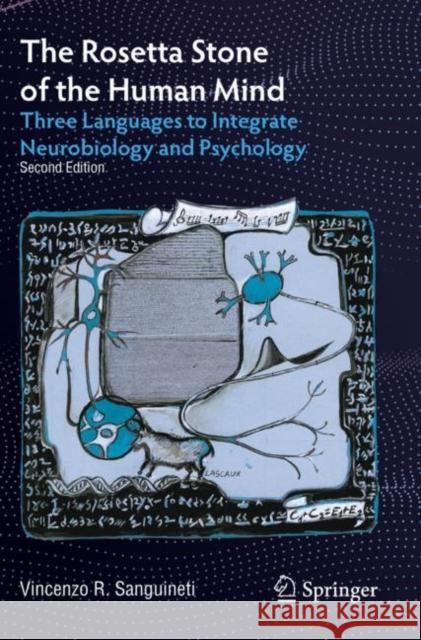The Rosetta Stone of the Human Mind » książka



The Rosetta Stone of the Human Mind
ISBN-13: 9783030864170 / Miękka / 2023 / 167 str.
The Rosetta Stone of the Human Mind
ISBN-13: 9783030864170 / Miękka / 2023 / 167 str.
(netto: 153,32 VAT: 5%)
Najniższa cena z 30 dni: 146,48
ok. 16-18 dni roboczych.
Darmowa dostawa!
Contents
Forewords:
Danatella Marazziti................................................................................................ ix
Alwyn Scott........................................................................................................... xi
Nick Mansfield..................................................................................................... xiii
David R. Hawkins............................................................................................... xvii
Introduction............................................................................................................. xxi
The Puzzle............................................................................................................... xxv
Part I: Learning the Languages.................................................................................... 1
1. Humanity’s Search for Mind and the Subject: A Brief Review
of the Evolution of Neuropsychobiology.................................................................. 3
2. An “Ideographic,” Suprapersonal Language of Rules and Universal
Symbols: Alwyn Scott and Nonlinear Dynamics................................................... 15
3. A “Demotic,” First-Person Language of the Individual and the
Social System: Apuleius and the Myth of Psyche................................................... 27
4. The Language of the Objective Observer: Gerald Edelman and Neurodarwinism: Antonio Damasio and the Feeling of Knowing................................................................... 33
Gerald Edelman and Neurodarwinism................................................................................................ 35Antonio Damasio and the Feeling of Knowing................................................................................. 39
Part II: Seeking the Understanding............................................................................ 45
5. Consciousness......................................................................................................... 47
6. The Unconscious..................................................................................................... 59
7. The Database........................................................................................................... 71
8. Affectivity............................................................................................................... 79
9. The Neural/Mental Gap: Intuition, Self and Ego, a Trilingual Map........................ 91
Part III: Applying the Knowledge............................................................................. 101
10. The Three Languages and Science: A New Scientific Paradigm?........................ 103
11. The Three Languages and Treatment.................................................................... 115
12. The Psychotherapeutic Dialogue: Intersubjectivity............................................... 127
13. The Role of a New Science for Psyche Upon Society and Culture...................... 135References........................................................................................................... 147
Name Index......................................................................................................... 151
Subject Index 153Vincenzo Sanguineti was born in Eritrea and lived there until completion of Medical School at the “Universita’ Degli Studi” in Milan, Italy. He then spent five years in Nigeria, where he conducted published field research in Tropical Medicine and directed a missionary hospital. Consequently, he profited from the prolonged exposure to uncontaminated natural habitats and to the degrees of difference and similarity among different species, and different human cultures, which enhanced his fascination for the interaction between the unique subjectivity of the self and the interactive processes stemming from the profound complexity of the individual and collective variables participating to the phase-space of the mind. Such interests evolved into more programmatic research that generated various studies and formed the basis of his books: “Landscapes in my Mind,” “The Rosetta Stone of the Human Mind,” and his fictional historical biography of Sarpedon, the mythical king of Lykia. Currently, Dr. Sanguineti is in private practice in Philadelphia, where he is Associate Professor in the Department of Psychiatry at Jefferson Medical Center, within the Sidney Kimmel Medical College.
The study of the brain-mind complex has been hampered by the dichotomy between objective biological neuroscience and subjective psychological science. The two antithetical avenues of research are partly responsible for the failure to unravel the transformation of neural events into mental images: how matter becomes imagination, and vice versa; is the brain’s consciousness equivalent to Ego consciousness? Is the ego the self? In its new and updated edition, “The Rosetta Stone of the Human Mind: Three Languages to Integrate Neurobiology and Psychology” illustrates how the simultaneous use of the languages of neurobiology, of mathematics, and of the humanities, enriches the understanding of the neural and mental realms and adds new dimensions to our perception of neuropsychological events. Dr. Sanguineti shows how the two seemingly dichotomous approaches are similar in what they describe, and he explores how the awareness and application of these perspectives are helpful in getting a deeper theoretical grasp on major mental events, giving us a better understanding of individual minds, and fostering a more integrated therapeutic intervention. The intended readers include neuroscientists, psychiatrists, psychologists, and anyone interested in the human mind.
Describes a model integrating biological neuroscience principles, subjective psychological science, and nonlinear physics and mathematics
Offers a wide-ranging, holistic exploration of the mind and its conscious and unconscious realms, using myth, art, philosophy, neurobiology and basic sciences
Introduces the future new paradigm for emergent science, the Poem, to replace the outdated classical reductionistic paradigm of the Machine
1997-2026 DolnySlask.com Agencja Internetowa
KrainaKsiazek.PL - Księgarnia Internetowa









